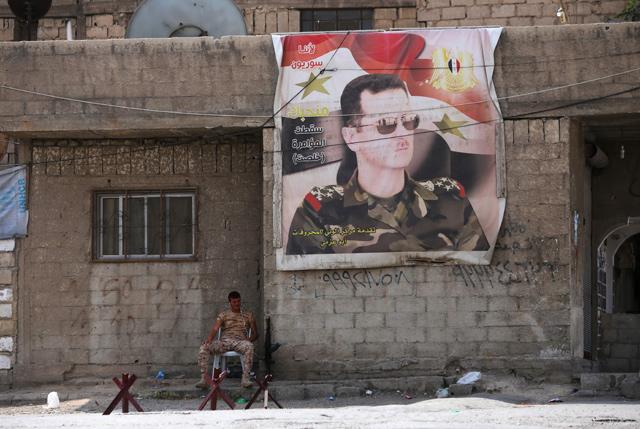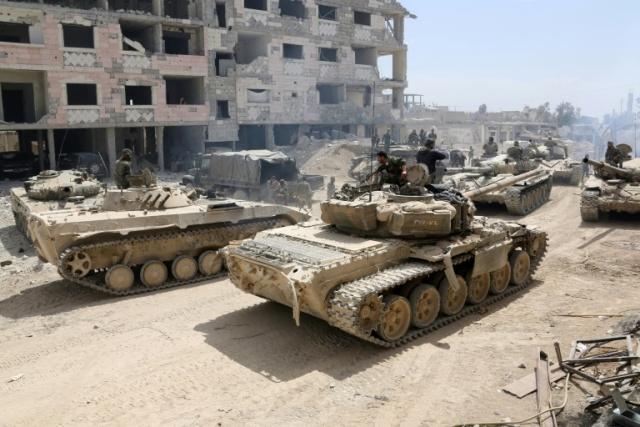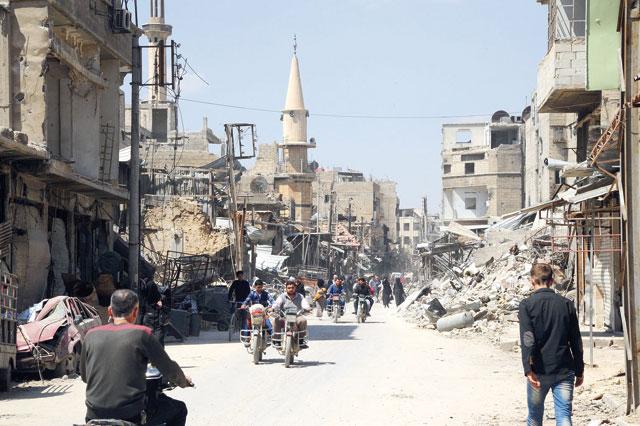You are here
Syria rebels give up Ghouta in major win for regime
By AFP - Apr 12,2018 - Last updated at Apr 12,2018

A Syrian soldier sits next to a poster of the Syrian president at the entrance of the Wafideen Camp as they wait for the arrival of buses carrying Jaish Al Islam fighters and their family members evacuated from the Eastern Ghouta town of Douma on Thursday (AFP photo)
WAFIDEEN CHECKPOINT, Syria — Rebels in Syria’s Eastern Ghouta surrendered their heavy weapons and their leader left the enclave, a monitor said Thursday, signalling the end of one of the bloodiest assaults of Syria’s seven-year war.
The Syrian flag was raised above the central mosque in Douma, the town where the regime is accused of carrying out a chemical attack that sparked outrage and threats of Western military action.
US President Donald Trump was mulling his options and British Prime Minister Theresa May called an emergency Cabinet meeting on Thursday, as the Syrian army braced for Western strikes, hiding assets and deserting key buildings.
Jaish Al Islam, which has controlled Eastern Ghouta’s main town for years, had balked at a Russian-brokered deal like those that saw other factions bussed to northern Syria.
The group’s political chief told AFP it was a chemical attack by the regime that forced them to accept Russia’s terms and evacuate their former bastion.
“Of course, the chemical attack is what pushed us to agree” to a withdrawal from Douma, said Yasser Dalwan.
Syrian regime forces had yet to take over Douma Thursday, but according to the Syrian Observatory for Human Rights, the rebels handed over their heavy weapons.
“Jaish Al Islam fighters handed over their heavy weapons to Russian military police in the town of Douma on Wednesday,” the Britain-based monitoring group said.
Their top leader, Issam Buwaydani, boarded a convoy out of Ghouta with thousands of other fighters and their relatives, it said.
“Not all the leadership has left yet. Departures are ongoing,” Dalwan said.
Flag raised
Douma residents told AFP that Syria’s national red, white and black flag with two green stars was raised on Wednesday above the main mosque, which was also used as the office of the town’s opposition-run council.
But a dispute subsequently erupted, shots were fired and the flag was taken down, the residents said.
Russian military police, who had started deploying in the town as part of a deal that would allow some rebels to disarm and stay in Douma, also left after the incident, the residents said.
Simultaneously carrying out air strikes, brokering talks and supervising humanitarian operations, Russia was the key player in an assault that left at least 1,700 civilians dead.
“Today a significant event in the history of Syria took place,” Major General Yury Yevtushenko, head of the Russian military’s centre for reconciliation in Syria, was quoted as saying by the Interfax news agency.
“The raising of a regime flag over a building in the town of Douma signified control over this town and consequently over Eastern Ghouta as a whole,” he said.
It was not clear whether he was referring to the flag that was taken down or to another.
Assad recovery
Moscow also said Russian military police had returned to the town on Thursday and were in full control.
“From today, units of the Russian armed forces’ military police are working in the town of Douma,” the defence ministry said.
Yet chaos and confusion prevailed in the streets of Douma, where civilians appeared to have very little information on the latest political developments.
Many residents were preparing to take what should be some of the last buses leaving the region to head to parts of northern Syria still under rebel control.
“Eighty buses will be evacuated today. Seventeen of them are already at the gathering point, waiting for the rest of the convoy,” a Syrian military source said on condition of anonymity.
The official said the rebels had burned tanks they had been expected to hand over before leaving.
According to the Russian military, more than 160,000 people have been evacuated from Eastern Ghouta, which only two months ago was a sprawling rebel enclave within mortar range of central Damascus.
The government of President Bashar Assad, which since Russia’s military intervention in 2015 has gradually reasserted what was once a very tenuous grip on the country, was keen to secure an area that directly threatened the capital.
“Victory in Ghouta is a critical point,” Bouthaina Shaaban, a top Assad adviser, said on the Lebanese channel Al Mayadeen.
“It has sent a message to the whole world that Syria’s army and its allies can liberate every inch of Syrian territory,” she said.
The Syrian pound has risen significantly as the operation to flush rebels out of Ghouta wrapped up.
Regime and allied forces are next expected to train their sights on areas in southern Damascus that are almost empty of civilians but still controlled by the Daesh terrorist group.
According to the observatory, more than 350,000 people have been killed in seven years of conflict, including a proportion of children that has risen sharply over the past year.
While the scramble for Syria that followed the collapse of Daesh’s self-styled “caliphate” last year is winding down in some parts of Syria, the humanitarian emergency is still acute.
According to the International Committee of the Red Cross, 2.9 million people were forced from their homes last year, or nearly 8,000 people every day.
Related Articles
Moscow - The Russian defence ministry said Thursday that the Syrian regime flag is flying in the town of Douma, which it said meant governme
DAMASCUS, Syria — The Syrian army has declared that all anti-regime forces have left Eastern Ghouta, after a blistering two month offensive
BEIRUT — At least 11 people were left struggling to breathe on Saturday after air strikes on Syria’s rebel town of Douma, a monitor said, as
















